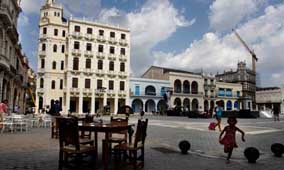Cuba suffers exodus of the best and the brightest

Havana is being emptied of young people who are choosing emigration
Parque Trillo used to be a lively pocket of Havana. A small open space bounded by four streets, it was where Cubans came to gossip, shop, play baseball and dance.
On the surface little has changed. Pensioners chat on benches, housewives trawl the food market, teenage boys take turns swinging a bat, and the Palacio de la Rumba nightclub throbs after dusk.
Things are gritty – buildings are dilapidated, grass is strewn with rubbish and the park's blue pillars are discoloured and peeling – but that is hardly new.
Jaime Valdés, however, has noticed one big change. "It's a lot quieter these days. Young people are disappearing. The ones in their 20s and 30s, they've left."
From his bench the retired chemist pointed to San Rafael street. "Fifteen from there, gone." He pointed to San Miguel street.
"There, another nine or 10, gone." From Aramburu street, another eight, and from Hospital street, about a dozen, said Valdés. "It's an exodus."
Neighbourhoods across Havana report the same phenomenon. Young people, especially well-educated professionals, are fleeing the island.
Tens of thousands have emigrated in the past two years. The exodus has alarmed the Cuban government but remains largely unreported.
After formally succeeding his brother Fidellast year, president Raul Castro promised economic liberalisation, but the average monthly wage remains $20 (£14).
A government-organised free concert on the Malecón seafront attracted a small fraction of the expected audience.
Unlike the mass exodus of the Mariel boatlift in 1980, when a chaotic scramble across the Florida straits seized world attention, this new wave of emigration has involved an orderly – and discreet – transit through Havana's José Martí airport.
"At least 80% of my peers have left," said José-Miguel Marín, a 38-year-old scientist. "I keep track through Facebook. They are all over: Ecuador, Mexico, the United States, Spain."
Bureaucratic and financial hurdles remain, but Cuba has loosened restrictions on leaving, opening the door to those who have the will and means to wrangle a visa for another country.
Often that means the best and brightest. "I saw people weeping when they were turned down for a US visa," said Carmen Gonce, 65, after visiting the office that represents US interests in Havana.
Ecuador has become a magnet, because it requires only a letter of invitation rather than a visa.
Last year Cuban arrivals soared by 147% to 27,114, according to the national immigration agency.
The number of Cubans marrying Ecuadoreans jumped from 88 in 2007 to 1,542 in the first nine months of 2009.
Not all stay: some buy clothes and other goods and return home to resell at a hefty mark-up. Others swiftly hopscotch on to other countries, especially the US.
All the same, Quito's La Florida district has become a "little Miami", with Cuban bars and restaurants.
Cuba's population stopped growing in 2006 and is now shrinking at a rate unseen since the cholera epidemic and wars of the 19th century.
A population of 11,237,154 in 2007 is expected to dwindle by 77,000 in the next two decades.
Partly that represents a success for 51 years of communist rule: good education and healthcare help the Cubans to live as long as Americans, and lower ertility rates resemble the demographic curve of many western countries.
Emigration is the other major factor, but in this Cuba is hardly unique. Poland and Ireland, for instance, haemorrhage young professionals during times of economic distress.
The difference is that Cuba was supposed to be enjoying a new dawn. There have been modest steps: greater autonomy for farmers; the ban on owning computers, mobile phones and DVD players has been lifted; de facto privatisation of barber shops and beauty salons; bureaucracy clipped in provincial towns.
By: Rory Carroll in Havana
* The Observer, Sunday 9 May 2010
Source: www.guardian.co.uk/
Comments